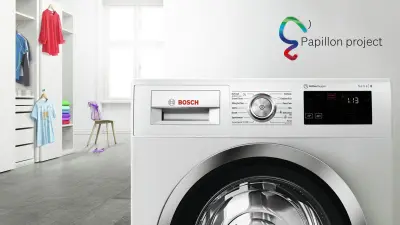EHS Awards 2019: Recognized sustainability
Smart and sustainable solutions for people and the environment

Every year, Bosch celebrates the inventive talent of its associates with the Environment, Health, and Safety (EHS) Award. In 2019, a total of 162 project teams submitted entries for the coveted award. Find out more below about the specific projects that the four winners have implemented.
Invented for life: Our associates’ ideas
At Bosch, we are motivated by the desire to develop products that are “Invented for life,” that spark enthusiasm, that improve quality of life, and that help conserve natural resources. And time and again we are reminded that each and every idea is driven by our associates’ passionate search to find sustainable solutions. Day after day, they work at the individual company sites to make processes more energy- and resource-efficient, to make the workplace even safer, and to sharpen the focus of new product development on sustainability.
In recognition of this commitment and in order to disseminate innovative ideas beyond the boundaries of individual company sites, Bosch presents the annual EHS Award. An international jury made up of experts from various corporate sectors evaluates the projects submitted in the four categories ““Energy efficiency,” “Resource efficiency,” “Occupational health and safety,” and in the new category “Sustainable products” — from which it chooses four winning teams. Bosch’s board of management member responsible for sustainability sponsors the award and hosts the ceremony.
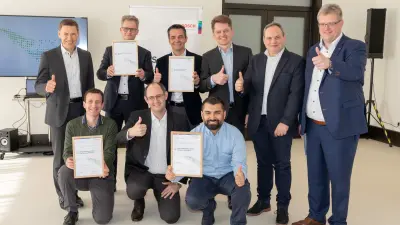
Increasing energy efficiency, reducing CO₂
Saving 700 metric tons of CO₂ annually by using energy efficiently: the German plant in Reutlingen demonstrates how smart temperature management contributes to climate protection — an initiative that has earned it first prize in the “Energy efficiency” category.
In Reutlingen, microchips are manufactured in fully air-conditioned clean rooms. As a result, the plant needs heat year-round. Particularly in the summer, when it is already hot, the plant therefore has surplus heat. The solution? Through the targeted replacement of heat exchangers in the heating system, it was possible to systematically lower the temperature curve of the heating circuit and make use of the available waste heat for heating purposes. Today, the boilers are switched off to match changes in demand — reducing their annual running time by roughly 45 percent. This approach saves the site around 3,000 megawatt-hours of energy each year — enough to cover the annual consumption of some 1,000 two-person households.
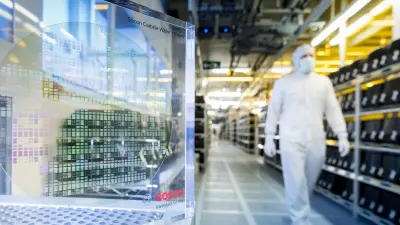
“Energy-efficient solutions such as our temperature management actively contribute to reducing climate impact. At the same time, they provide an important lever for hitting our ambitious climate targets at Bosch.”
Prolonging product life — saving resources
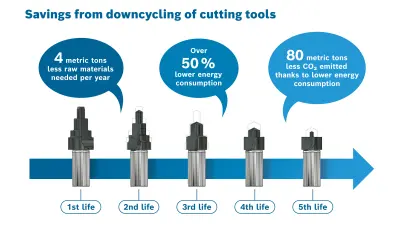
More than 40 different cutting tools are used at the plant in Bursa, Türkiye. Annually, the site needs around 40 metric tons of carbide to manufacture the tools. In the past, the tools were sharpened several times over their entire life cycle until they were ultimately disposed of. With what is known as the downcycling method, the project team extended the service life of the tools — earning it first prize in the category “Resource efficiency.”
Thanks to the new method, the tools get four additional life cycles. In each cycle, the cutting tools are given a new shape and repurposed. At the end of the final life cycle, only very small amounts of material are left over for recycling. Downcycling allows the plant to not only save raw materials, but also cut production time, energy consumption, and CO₂ emissions.
“The downcycling method we have developed helps us to use existing resources more efficiently.”
Smart app for occupational health and safety
Paving the way with digital solutions to an accident-free workplace: at the plant in Wuxi, China, the “near miss” app ensures that accidents are prevented before they happen. This innovation won the site first place in the “Occupational health and safety” category.
With the new app, it is possible to manage the entire process from notification to the elimination of potential hazards. The only thing associates need is a smartphone. If an associate reports a hazard, the contact person responsible is informed within a mere 45 seconds. Accordingly, hazard sources can be documented and eliminated much faster. The approximately 8,000 associates at the site benefit from the new app in two ways: their workplace is becoming safer and with each contribution they earn virtual coins they can redeem in an online shop.
“Our project thrives on the joint commitment of all colleagues: with the app, all associates can report hazards quickly and easily — and help make the workplace safer for everyone.”
Getting better — with every new generation
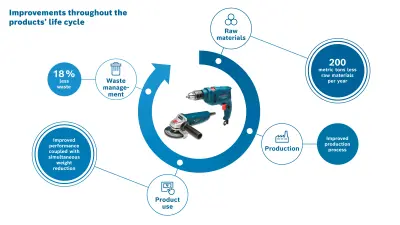
Saving raw materials and improving performance at the same time: by redesigning three Bosch power tools, the Power Tools team in Campinas, Brazil, succeeded in holistically implementing sustainability in product design. The site’s initiative was recognized with the first-ever award in the category “Sustainable products.”
Focusing on user-friendliness and sustainability, the project redesigned an angle grinder and two impact drills. Compared with their predecessor models, the newly designed products feature effective improvements over their entire life cycle — from the use of raw materials to waste management. The outcome: a decrease of 200 metric tons in the raw materials used in production, lighter and more efficient tools for users, and 18 percent less waste at the end of the life cycle.
“By redesigning the tools, we have been able to improve the sustainability performance over the products’ entire life cycle.”
Conclusion
A total of 162 project teams from 22 countries are testament to our associates’ outstanding ability to come with efficient, sustainable, and safe solutions. Through their dedication, they are taking on responsibility for people and the environment — and helping to drive forward sustainability at Bosch every day.

